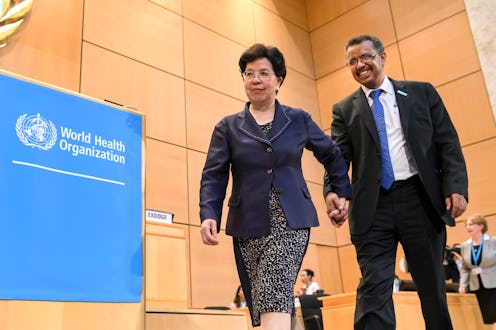News
The Majority Of The World Health Organization's New Leadership Team Are Women

After Donald Trump surprised everyone by beating Hillary Clinton in the 2016 presidential election, you could be forgiven for being worried that the push for women in leadership roles had stalled. But there is of course a massive world out there outside of the United States, and much of it is continuing to push women's equality even as the United States seems to de-prioritize it for the time being. On Tuesday, the World Health Organization announced a leadership team that is 60 percent women.
The WHO is a part of the United Nations, which has helped to coordinate global health policy since its founding in 1948. At the beginning of July, its new director-general, former Ethiopian Minister of Health and Minister of Foreign Affairs Tedros Ghebreyesus, began his 5-year term. On October 3, he announced the 14 members of the team that would serve under him and coordinate health policy worldwide. Of the 14 positions, 9 are filled by women.
“The team represents 14 countries, including all WHO regions, and is more than 60% women, reflecting my deep-held belief that we need top talent, gender equity and a geographically diverse set of perspectives to fulfil our mission to keep the world safe,” Dr. Tedros said in a statement put out by the WHO.
The women set to lead the WHO are:
- Dr. Soumya Swaminathan, the current director general of the Indian Council of Medical Research. Swaminathan will serve as Deputy Director-General for Programmes.
- Jane Ellison, a member of the UK Parliament who served as Parliamentary Undersecretary of State for Public Health from 2013 to 2016. She will serve as Deputy Director-General for Corporate Operations.
- Dr. Naoko Yamamoto, former Senior Assistant Minister for Global Heath in Japan's Ministry of Health, Labour, and Welfare. She will serve as Assistant Director-General for Universal Health Coverage and Health Systems Cluster.
- Professor Lubna A. Al-Ansary, head of the Clinical Practice Guidelines Committee at King Saud University in Riyadh, Saudi Arabia. She will serve as Assistant Director-General for Metrics and Measurement.
- Dr. Svetlana Akselrod hails from the Russian Federation and has previously worked for the WHO as Coordinator at the WHO European Office for the Prevention and Control of Noncommunicable Diseases. She will serve as Assistant Director-General for Noncommunicable Diseases and Mental Health
- Ambassador Michèle Boccoz, French ambassador on combating AIDS and HIV, and before that ambassador to Belgium and Croatia. She will serve as Assistant Director-General for External Relations.
- Dr. Mariângela Batista Galvão Simão of Brazil previously served as Director of Community Support, Social Justice and Inclusion at UNAIDS. She will serve as Assistant Director-General for Drug Access, Vaccines and Pharmaceuticals.
- Dr Princess Nothemba (Nono) Simelela, former Special Advisor to the Vice President of the Republic of South Africa. She will serve as Assistant Director-General for Family, Women, Children and Adolescents.
- Dr Joy St John of Barbados spent 10 years as the Chief Medical Officer for Barbados. She will serve as Assistant Director-General for Climate and Other Determinants of Health.
In addition to the 9 women who will lead the WHO, Dr. Tedros announced 5 men: Dr. Peter Salama, Dr. Bernhard Schwartländer, Dr. Ranieri Guerra, Dr. Ren Minghui, and Stewart Simonson.
Women in leadership roles is not just a symbolic exercise. Numerous studies have shown that more women in leadership roles often lead to public policy that focuses more on women. With women's health being an essential party of the WHO's mandate and issues like access to reproductive health care and abortion, as well as domestic violence and sexual assault remaining issues that affect health outcomes worldwide, having women leading the coordinated response can help female health needs stay centered. It's been 169 years since Elizabeth Blackwell became the first woman to graduate from a medical school, but now we have women ready to take the lead on health care for the whole world.